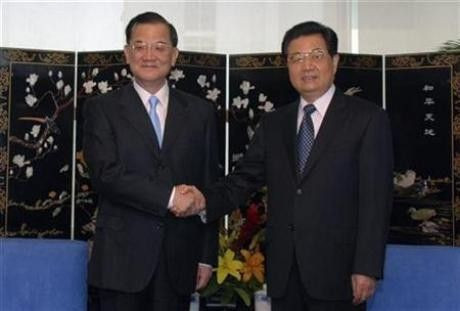David And Two Goliaths: Taiwan Fears Getting Caught Between US And China

With the next crop of leaders in Beijing chosen, and the president in Washington re-elected for the next four years, Taiwan ought to be relaxing. Instead, the island republic off mainland China can't help but wonder if its future has turmoil in store. As an empowered Obama continues with America's strategic refocusing on the Asia-Pacific region -- known as the "pivot," which really means containing China -- the island nation might get caught between the two giants.
On paper, Obama's re-election should please Taiwanese officials. According to Taiwan's President and Kuomintang (KMT) party chairman Ma Ying-jeou, the two governments have achieved the most stable relationship they've ever had.
It's a relationship Taiwan needs badly. As the island has suffered from the global recession, it cannot do without the world's biggest economy to regain its economic footing.
A spat with the United States over beef imports, which threatened to hurt Taiwan, has cooled off, and that has led to a possible renegotiation of the Trade and Investment Framework Agreement with the U.S.
In 2007, Taiwan approved imports of U.S. beef containing traces of a previously banned additive, to the dismay of the Taiwanese. In 2010, lawmakers blocked the beef imports, angering U.S. officials.
But in July, Taiwan's ban on the beef containing the additives was loosened, allowing small amounts to be imported, to the satisfaction of both governments and leading to the re-opening of TIFA negotiations.
With Taiwan and the U.S. on track to re-establish trade negotiations, Taiwan still needs the two superpowers to get along.
Bruce Linghu, head of the North American division of the Ministry of Foreign Affairs, told Radio Taiwan International that the currently positive -- yet fragile -- relations among the three governments are unlikely to change.
"The Obama administration's trilateral policy [of] China, the U.S. and Taiwan, based on the Taiwan Relations Act… basically, will not change," he said.
Essentially, the U.S. does not want to upset the formula of "one China, two systems," set forth by President Jimmy Carter's administration in 1979 when he established full diplomatic relations with Beijing. The Taiwan Relations Act satisfied all three parties, and basically acknowledged that Taiwan was part of China, and would deal with the U.S. without diplomatic relations, and instead through the channels of the American Institute in Taiwan (that is, instead of an embassy).
But the status quo could be threatened by the reality of souring relations between two of Taiwan's top three biggest trade partners.
During the presidential campaign, both Obama and Mitt Romney ramped up anti-China rhetoric and promised a crackdown on its allegedly unfair competition practices, turning the nation into what the international media has called "a political punching bag."
Both candidates made bold statements about punishing China, but the Beijing government barely batted an eye. Indeed, long before the election, the U.S.-China relationship was largely focused on cooperation rather than confrontation.
In a few short months, however, that scenario is changing.
For example, SEC filings against Chinese affiliates of U.S. accounting companies have put Chinese tax employees, and thus many Chinese companies, into a precarious situation. At the same time, after North Korea's rocket launch, the U.S. has pushed the U.N. Security Council to impose sanctions on the isolated nation, but China's permanent membership on the council gives it a veto.
As the U.S. seeks to expand its military forces in various parts of the Asia-Pacific region -- deploying Marines to northern Australia, for example -- the Chinese see a plan of encirclement.
A threatened China could take military action, and disrupt the fragile status quo of de facto Taiwanese independence. Moreover, both the U.S. and China could leverage Taiwanese economic dependence as way of gaining support, thereby placng an ill-equipped Taiwan in the middle of a potential superpower crossfire.
With a disproportionately small arsenal, and a military that will soon move to volunteer service from its current one-year draft, Taiwan's military is no match for mainland China.
Taiwan needs both the U.S. and China to prosper.
An op-ed in the Taiwanese magazine Common Wealth noted that Taiwan will be helpless if China and the U.S. do not continue on a path of cooperation.
"Any single policy implemented by either Obama of Xi Jinping will affect Taiwan's economy and the welfare of its citizens," it declared.
© Copyright IBTimes 2025. All rights reserved.






















